Giovambattista Ianni
University of Calabria
ASP-based Multi-shot Reasoning via DLV2 with Incremental Grounding
Dec 24, 2024Abstract:DLV2 is an AI tool for Knowledge Representation and Reasoning which supports Answer Set Programming (ASP) - a logic-based declarative formalism, successfully used in both academic and industrial applications. Given a logic program modelling a computational problem, an execution of DLV2 produces the so-called answer sets that correspond one-to-one to the solutions to the problem at hand. The computational process of DLV2 relies on the typical Ground & Solve approach where the grounding step transforms the input program into a new, equivalent ground program, and the subsequent solving step applies propositional algorithms to search for the answer sets. Recently, emerging applications in contexts such as stream reasoning and event processing created a demand for multi-shot reasoning: here, the system is expected to be reactive while repeatedly executed over rapidly changing data. In this work, we present a new incremental reasoner obtained from the evolution of DLV2 towards iterated reasoning. Rather than restarting the computation from scratch, the system remains alive across repeated shots, and it incrementally handles the internal grounding process. At each shot, the system reuses previous computations for building and maintaining a large, more general ground program, from which a smaller yet equivalent portion is determined and used for computing answer sets. Notably, the incremental process is performed in a completely transparent fashion for the user. We describe the system, its usage, its applicability and performance in some practically relevant domains. Under consideration in Theory and Practice of Logic Programming (TPLP).
Rethinking Answer Set Programming Templates
Jul 12, 2023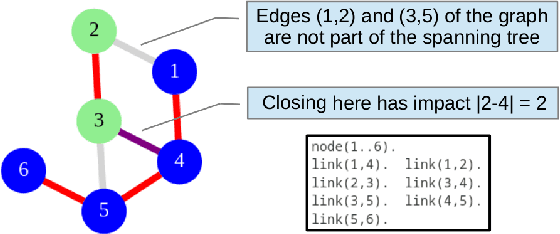


Abstract:In imperative programming, the Domain-Driven Design methodology helps in coping with the complexity of software development by materializing in code the invariants of a domain of interest. Code is cleaner and more secure because any implicit assumption is removed in favor of invariants, thus enabling a fail fast mindset and the immediate reporting of unexpected conditions. This article introduces a notion of template for Answer Set Programming that, in addition to the don't repeat yourself principle, enforces locality of some predicates by means of a simple naming convention. Local predicates are mapped to the usual global namespace adopted by mainstream engines, using universally unique identifiers to avoid name clashes. This way, local predicates can be used to enforce invariants on the expected outcome of a template in a possibly empty context of application, independently by other rules that can be added to such a context. Template applications transpiled this way can be processed by mainstream engines and safely shared with other knowledge designers, even when they have zero knowledge of templates.
Incremental maintenance of overgrounded logic programs with tailored simplifications
Aug 06, 2020Abstract:The repeated execution of reasoning tasks is desirable in many applicative scenarios, such as stream reasoning and event processing. When using answer set programming in such contexts, one can avoid the iterative generation of ground programs thus achieving a significant payoff in terms of computing time. However, this may require some additional amount of memory and/or the manual addition of operational directives in the declarative knowledge base at hand. We introduce a new strategy for generating series of monotonically growing propositional programs. The proposed overgrounded programs with tailoring (OPTs) can be updated and reused in combination with consecutive inputs. With respect to earlier approaches, our tailored simplification technique reduces the size of instantiated programs. A maintained OPT slowly grows in size from an iteration to another while the update cost decreases, especially in later iterations. In this paper we formally introduce tailored embeddings, a family of equivalence-preserving ground programs which are at the theoretical basis of OPTs and we describe their properties. We then illustrate an OPT update algorithm and report about our implementation and its performance. This paper is under consideration in Theory and Practice of Logic Programming (TPLP).
ASP-Core-2 Input Language Format
Nov 11, 2019Abstract:Standardization of solver input languages has been a main driver for the growth of several areas within knowledge representation and reasoning, fostering the exploitation in actual applications. In this document we present the ASP-Core-2 standard input language for Answer Set Programming, which has been adopted in ASP Competition events since 2013.
Proceedings 35th International Conference on Logic Programming (Technical Communications)
Sep 17, 2019Abstract:Since the first conference held in Marseille in 1982, ICLP has been the premier international event for presenting research in logic programming. Contributions are sought in all areas of logic programming, including but not restricted to: Foundations: Semantics, Formalisms, Nonmonotonic reasoning, Knowledge representation. Languages: Concurrency, Objects, Coordination, Mobility, Higher Order, Types, Modes, Assertions, Modules, Meta-programming, Logic-based domain-specific languages, Programming Techniques. Declarative programming: Declarative program development, Analysis, Type and mode inference, Partial evaluation, Abstract interpretation, Transformation, Validation, Verification, Debugging, Profiling, Testing, Execution visualization Implementation: Virtual machines, Compilation, Memory management, Parallel/distributed execution, Constraint handling rules, Tabling, Foreign interfaces, User interfaces. Related Paradigms and Synergies: Inductive and Co-inductive Logic Programming, Constraint Logic Programming, Answer Set Programming, Interaction with SAT, SMT and CSP solvers, Logic programming techniques for type inference and theorem proving, Argumentation, Probabilistic Logic Programming, Relations to object-oriented and Functional programming. Applications: Databases, Big Data, Data integration and federation, Software engineering, Natural language processing, Web and Semantic Web, Agents, Artificial intelligence, Computational life sciences, Education, Cybersecurity, and Robotics.
Incremental Answer Set Programming with Overgrounding
Jul 22, 2019
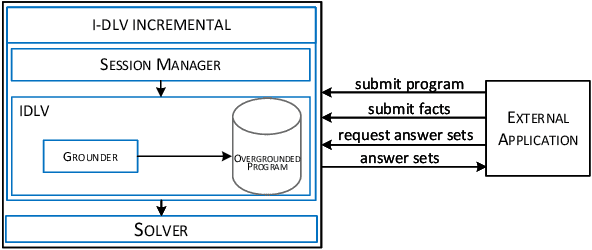
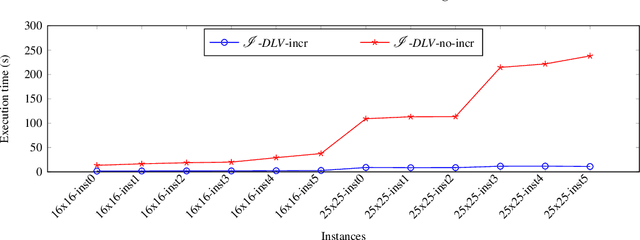

Abstract:Repeated executions of reasoning tasks for varying inputs are necessary in many applicative settings, such as stream reasoning. In this context, we propose an incremental grounding approach for the answer set semantics. We focus on the possibility of generating incrementally larger ground logic programs equivalent to a given non-ground one; so called overgrounded programs can be reused in combination with deliberately many different sets of inputs. Updating overgrounded programs requires a small effort, thus making the instantiation of logic programs considerably faster when grounding is repeated on a series of inputs similar to each other. Notably, the proposed approach works "under the hood", relieving designers of logic programs from controlling technical aspects of grounding engines and answer set systems. In this work we present the theoretical basis of the proposed incremental grounding technique, we illustrate the consequent repeated evaluation strategy and report about our experiments. This paper is under consideration in Theory and Practice of Logic Programming (TPLP).
A model building framework for Answer Set Programming with external computations
Jul 11, 2015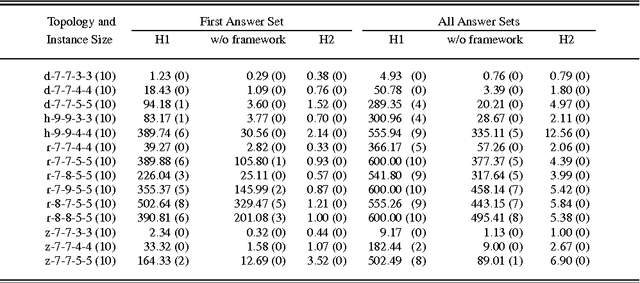
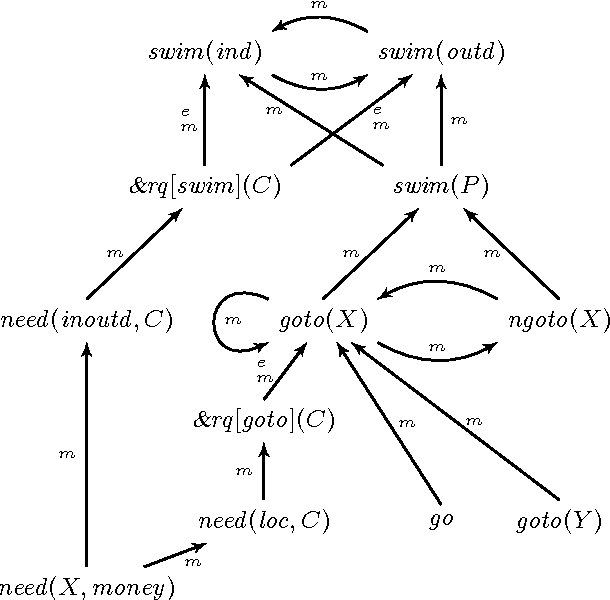
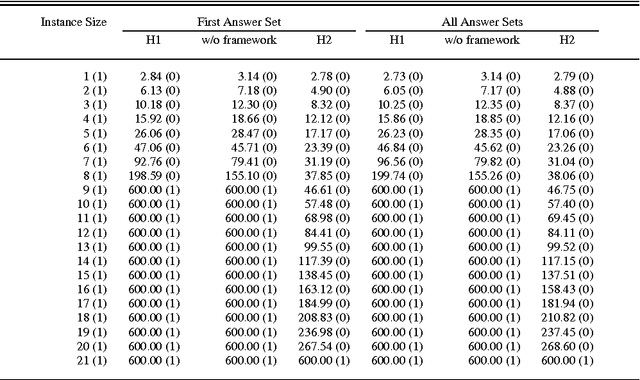
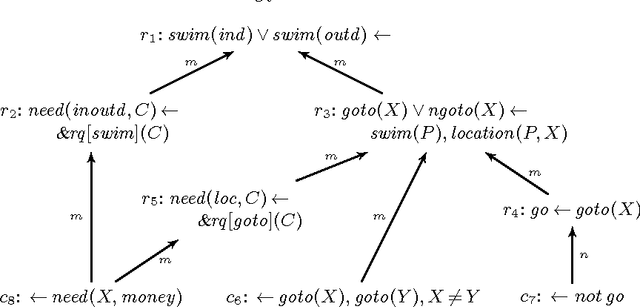
Abstract:As software systems are getting increasingly connected, there is a need for equipping nonmonotonic logic programs with access to external sources that are possibly remote and may contain information in heterogeneous formats. To cater for this need, HEX programs were designed as a generalization of answer set programs with an API style interface that allows to access arbitrary external sources, providing great flexibility. Efficient evaluation of such programs however is challenging, and it requires to interleave external computation and model building; to decide when to switch between these tasks is difficult, and existing approaches have limited scalability in many real-world application scenarios. We present a new approach for the evaluation of logic programs with external source access, which is based on a configurable framework for dividing the non-ground program into possibly overlapping smaller parts called evaluation units. The latter will be processed by interleaving external evaluation and model building using an evaluation graph and a model graph, respectively, and by combining intermediate results. Experiments with our prototype implementation show a significant improvement compared to previous approaches. While designed for HEX-programs, the new evaluation approach may be deployed to related rule-based formalisms as well.
* 57 pages, 9 figures, 3 tables, 6 algorithms, to appear in Theory and Practice of Logic Programming (accepted in June 2015)
The third open Answer Set Programming competition
Jun 14, 2012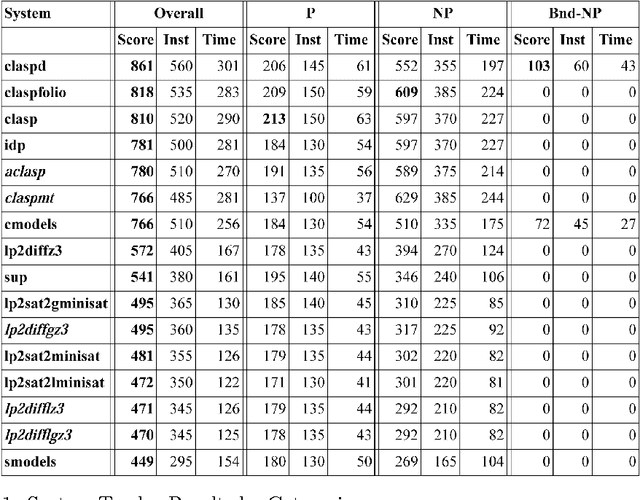

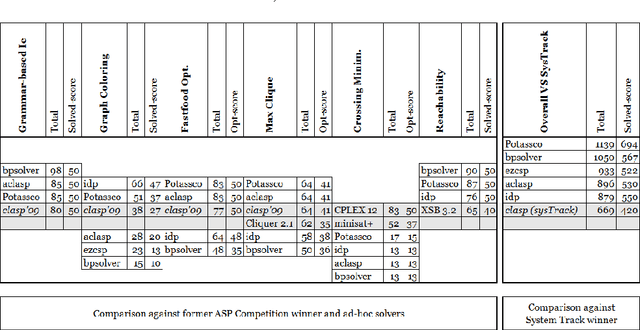
Abstract:Answer Set Programming (ASP) is a well-established paradigm of declarative programming in close relationship with other declarative formalisms such as SAT Modulo Theories, Constraint Handling Rules, FO(.), PDDL and many others. Since its first informal editions, ASP systems have been compared in the now well-established ASP Competition. The Third (Open) ASP Competition, as the sequel to the ASP Competitions Series held at the University of Potsdam in Germany (2006-2007) and at the University of Leuven in Belgium in 2009, took place at the University of Calabria (Italy) in the first half of 2011. Participants competed on a pre-selected collection of benchmark problems, taken from a variety of domains as well as real world applications. The Competition ran on two tracks: the Model and Solve (M&S) Track, based on an open problem encoding, and open language, and open to any kind of system based on a declarative specification paradigm; and the System Track, run on the basis of fixed, public problem encodings, written in a standard ASP language. This paper discusses the format of the Competition and the rationale behind it, then reports the results for both tracks. Comparison with the second ASP competition and state-of-the-art solutions for some of the benchmark domains is eventually discussed. To appear in Theory and Practice of Logic Programming (TPLP).
Intelligent Anticipated Exploration of Web Sites
Nov 06, 2001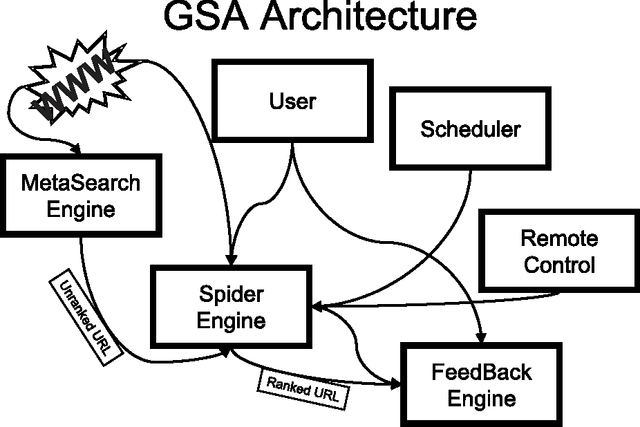

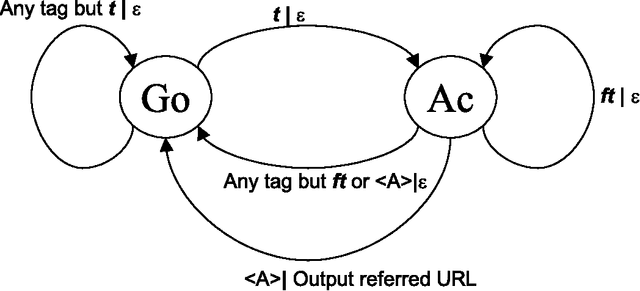
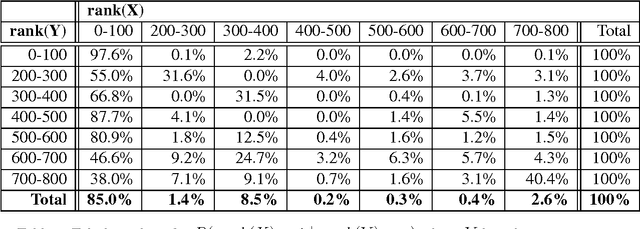
Abstract:In this paper we describe a web search agent, called Global Search Agent (hereafter GSA for short). GSA integrates and enhances several search techniques in order to achieve significant improvements in the user-perceived quality of delivered information as compared to usual web search engines. GSA features intelligent merging of relevant documents from different search engines, anticipated selective exploration and evaluation of links from the current result set, automated derivation of refined queries based on user relevance feedback. System architecture as well as experimental accounts are also illustrated.
 Add to Chrome
Add to Chrome Add to Firefox
Add to Firefox Add to Edge
Add to Edge